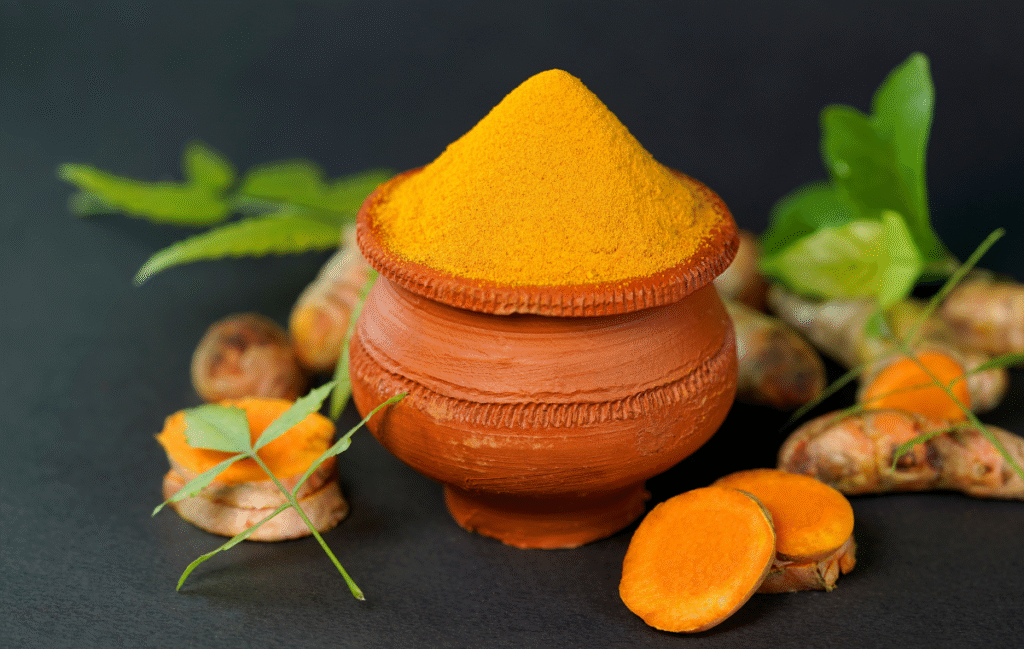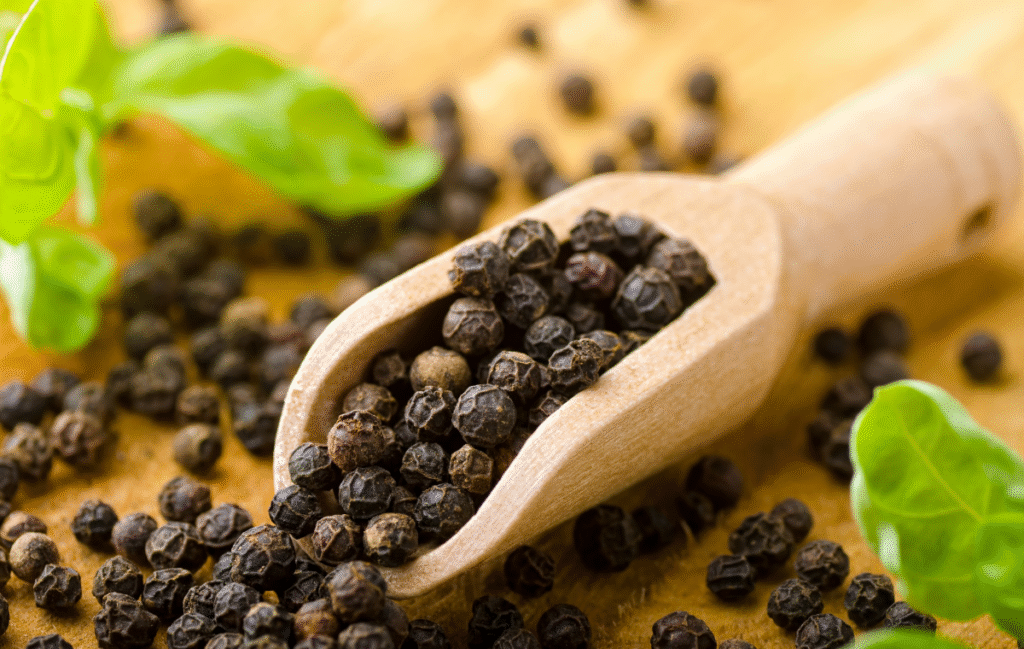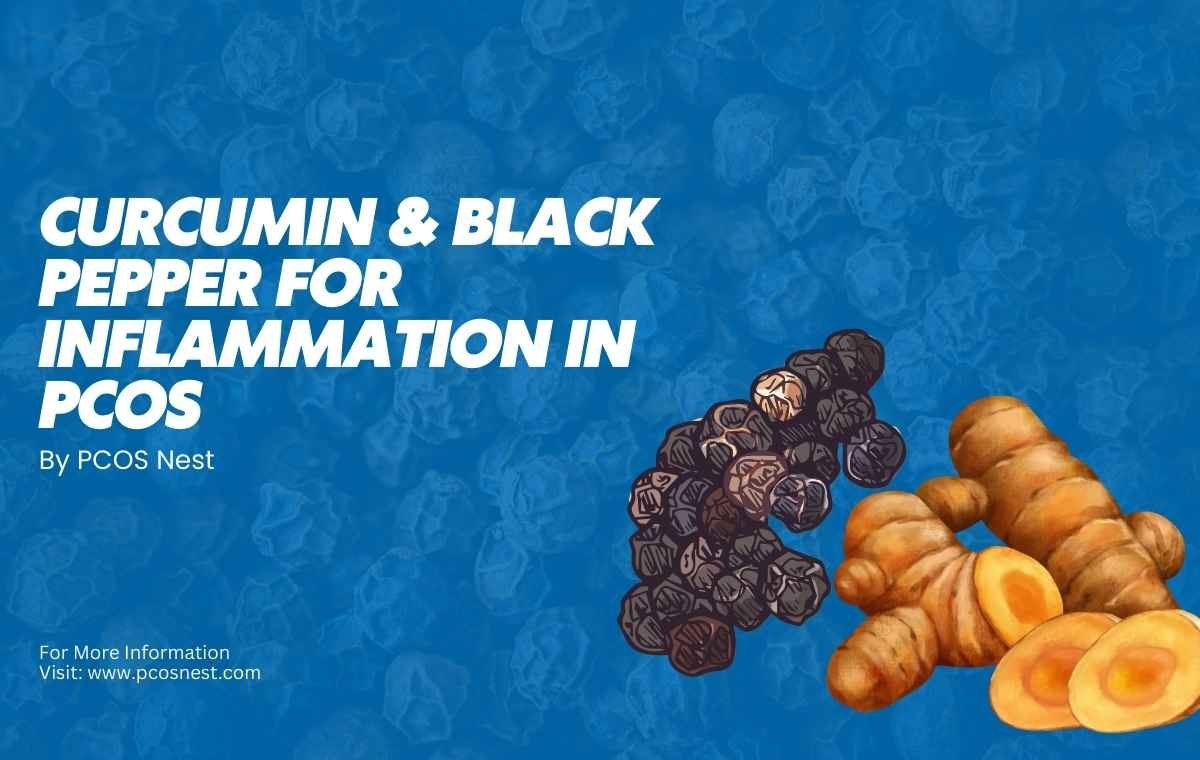Introduction:
Polycystic Ovary Syndrome (PCOS) is a common hormone condition that often includes irregular periods, acne, weight problems, and difficulty with fertility. One part of PCOS that many researchers and doctors focus on is low-level inflammation inside the body. People with PCOS often have higher markers of inflammation, and reducing inflammation can help with symptoms like insulin resistance and hormonal imbalance. In recent years, turmeric — more precisely curcumin, the main active compound in turmeric — and black pepper (which contains piperine) have become popular as a natural way to lower inflammation. This article explains how curcumin and black pepper may help in PCOS, what the research says, how to use them safely, and what to expect.
What is curcumin and why it matters:
Curcumin is a bright yellow compound found in turmeric root. Scientists have studied curcumin for many years because it acts as an antioxidant and reduces several types of inflammation in the body. Curcumin works on important inflammation pathways — for example, it can lower levels of molecules such as CRP and NF-κB that signal inflammation. Because inflammation is linked to insulin resistance and hormonal changes in PCOS, curcumin has become a natural option that some researchers test for improving PCOS symptoms.

Why black pepper piperine is included:
Curcumin on its own is not easily absorbed by the body. That means you might eat turmeric but only a small part of curcumin gets into the bloodstream. Black pepper contains piperine, a compound that blocks certain steps the liver and gut use to remove curcumin. When piperine is taken with curcumin, studies show that the amount of curcumin available in the body can increase manyfold — in some reports by up to 20 times or more. Because of this, most curcumin supplements add a small amount of piperine so the curcumin can work better.

Also Read: Licorice Root: Hormone Effects, Benefits & Cautions for PCOS
What research shows about curcumin and PCOS:
Research on curcumin for PCOS includes lab studies, animal studies, and a growing number of human trials. Some studies show curcumin can improve markers that matter in PCOS: it may reduce inflammation markers, help insulin sensitivity, and improve some hormone levels. A number of controlled clinical trials and reviews suggest curcumin may help with blood sugar control and reduce inflammation in women with PCOS, but results are not the same in every study. Overall, evidence is promising but not yet strong enough to say curcumin is a proven treatment for PCOS. More large and longer human trials are still needed.
How curcumin may help inflammation linked to PCOS:
Curcumin works at several points inside the body: it lowers inflammatory signaling molecules, improves antioxidant defenses, and can change how immune cells act. In animal models of PCOS, curcumin reduced ovarian inflammation and improved markers related to ovary health. In humans, curcumin supplements have been associated with lower CRP (a blood test for inflammation), better antioxidant status, and sometimes better blood sugar control. These effects can be helpful because inflammation and oxidative stress often make PCOS symptoms worse. However, the exact size of the benefit for each woman will vary.
Typical doses and forms:
Curcumin is available as ground turmeric spice and as concentrated curcumin extracts in supplements. Clinical studies use a wide range of doses — from a few hundred milligrams of curcumin per day up to several grams. Many supplements combine curcumin with piperine (black pepper extract) or use special forms designed to increase absorption. If you are using turmeric in food, adding a small pinch of black pepper and some healthy fat (like a little oil) helps your body absorb curcumin better. For therapeutic use, people usually take standardized curcumin supplements rather than relying on kitchen turmeric alone because the active curcumin amount in turmeric spice is relatively small.
Safety and interactions what to watch for:
Curcumin and black pepper are generally safe for many people when used in cooking or in common supplement doses. But they are not free of side effects or risks. Some people report mild digestive upset, and high doses of curcumin have been linked to liver enzyme changes in a few reports. Piperine can change how the body processes certain drugs — it may increase blood levels of medicines such as blood thinners, diabetes medicines, or some antidepressants. Because of this, it is important to talk with a healthcare provider before starting curcumin supplements, especially if you are on regular medications, pregnant, breastfeeding, or have liver disease. Also, products vary widely in quality, so choosing reputable brands with third-party testing is a good practice.
Practical suggestions for people with PCOS:
If you are considering curcumin and black pepper as part of your PCOS plan, here are simple, practical steps:
Start with food:
Try adding turmeric to cooking with a pinch of black pepper and a little healthy fat. This is safe and may give small benefits.
Consider a supplement if needed:
If you want a stronger effect, look for curcumin supplements that list curcumin content and include piperine or another bioavailability enhancer. Follow the dose on the label and consult your doctor.
Watch for interactions:
Tell your doctor about all medicines and supplements you take. Your provider can check for interactions, especially with blood sugar or blood-thinning drugs.
Use wisely:
Curcumin can be a helpful part of a broader PCOS approach that includes healthy eating, regular movement, weight management, and any medical treatments your doctor recommends.
Limitations and honest expectations:
Curcumin is not a cure for PCOS. It may help reduce inflammation and support metabolic health in some women, but it will not replace proven medical therapies or lifestyle changes. The research is promising but still limited: some studies show benefits, others show small or unclear effects. Think of curcumin as a supportive option that may add benefit when used with medical care and healthy habits.
Conclusion:
Turmeric’s active compound curcumin, especially when taken with black pepper (piperine), has clear anti-inflammatory effects and may help some women with PCOS by lowering inflammation and supporting metabolic health. The science is encouraging but not definitive; safety and drug interactions matter. If you are interested, start with dietary turmeric plus black pepper, and discuss supplements with your healthcare provider so you use them safely as part of a full PCOS plan. BioMed Central
References:
- Turmeric and Curcumin Supplements – Toxicokinetics (UK Food Standards / review)
- Therapeutic effect and safety of curcumin in women with PCOS (PMC review)

